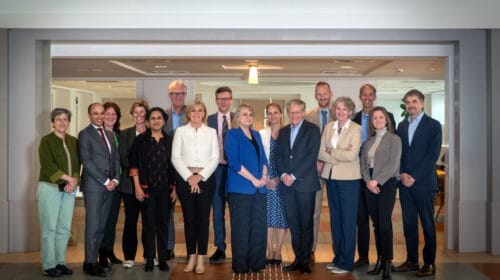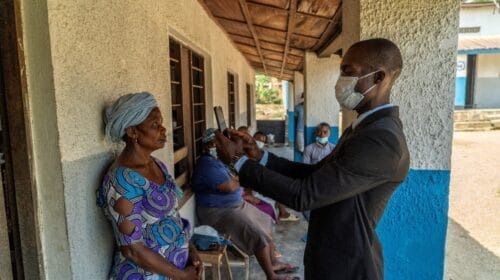OF AFRICA, ON NIGERIA: JONATHAN HAYNES ON NOLLYWOOD FILM CULTURE

BIOGRAPHY
Jonathan Haynes taught English at Long Island University for many years. He also worked at various universities in the United States, Egypt, Ghana, and Germany. Likewise, for more than three years, he was an American Fulbright scholar in some federal universities in Nigeria, cutting across almost all the geo-political zones. His academic interests are in English Renaissance literature, film, African Studies, and postcolonialism. He is well-versed in Film Studies from the Global South, especially the rise of the Nigerian film industry, Nollywood. Haynes received and benefited from the Guggenheim Fellowship. His books include Cinema and Social Change in West Africa (1995) and Nollywood: The Creation of Nigerian Film Genres (2016).
For Jonathan:
In our guest house, there are humans,
At every arrival, we sing the songs of masquerades,
We learn rituals of dance; we dance again at your welcome
Under the vast sky, where birds flaunt their feathers
Jonathan, you will break kola nut with us,
You will drink with us; you will tell our children
Tales about your home, you will sleep in our beds.
They say the earth does not end; the bird does not die in its nest,
May your life never know the sorrow of our world and your world
Today and after today, we will bring you well-wrapped gifts,
And as you go to other lands, may you never lose the flavor of life,
The wealth of knowledge and your smile that will be buried in our
Hearts for a long time….
(TF, Dec. 3, 2020)
The Interview
Toyin Falola:
(1) You claimed that Nollywood deserves credit for its role as chronicler of social history, taking on a didactic posture with cultural relevance to Nigeria’s essence and being. How has this informed and triggered your research into Nigerian Film? Who helped you to achieve this uncommon goal?
Jonathan Haynes
When the video films first appeared in the early 1990s, I was struck by how much of Nigerian life was visible through them. I was new in Nigeria then and fascinated by the country—as I still am—and this new medium gave me a way to focus my interest. It was a new medium, whose point of view was yet to be explored critically. In every sense, the video films emerged out of the Structural Adjustment Program crisis. I don’t want to flatten out the meaning of the films—many different things were going on in them—but one central thing was Nigerian society expressing its revulsion at the corruptions sponsored by military rule, a reaction mounted on the basis of a complex moral, social, and political heritage for which I came to have a good deal of respect.
Individual films were almost always framed in moral terms rather than social-historical ones, as were the discourses that emerged around the films. Interpreting the films as a chronicle (and a product) of social history was my move as a critic and cultural historian. It came naturally to me since that was the kind of work I had been doing in the first phase of my career when working on English Renaissance literature and theater. Just before I abandoned that career and came to West Africa, I’d written a quietly Marxist book about Elizabethan drama called The Social Relations of Jonson’s Theater (Cambridge UP 1992), which tried to interpret features of the theater than Ben Jonson (and Shakespeare) worked in as the product of a multifarious heritage and responses to immediate social pressures. When I moved physically and intellectually to West Africa, my intention was an utter change in my mental landscape. Still, as the Roman poet Horace said, those who rush across the seas change their skies, not their souls… though it took a long time before the similarities in approach between my old project and my new one became apparent to me.
Biodun Jeyifo’s The Yoruba Popular Travelling Theatre of Nigeria (1984) was a revelation, the book that gave me an orientation I could use to think about the videos, and then Karin Barber’s work on the African popular arts, which also came out of the Marxist tradition—in her case, Birmingham cultural studies, to which I felt especially close.

Photo: Panel with Anouk Batard and Carmen McCain, University of Lagos, 2011
Toyin Falola:
(2) Your scholarship is noted for insisting upon framing African literature and cinema as not based on Afropessimism and the narration of poverty porn prevalent in most Africanist scholarship presently. What do you think scholars should do to narrate Nigeria as a dynamic and multicultural nation to which t Africans in the diaspora should contribute as well.
Jonathan Haynes:
Another reason I had for choosing to work on the video films was that, in the midst of the catastrophic destruction of so many things in early 1990s Nigeria, something new was being born, and it was vigorous and strong and full of life. Ever since, I’ve listened to people complain about the terrible situation of the industry—with reason!—but all the while, the industry has grown by leaps and bounds.
Unlike foreigners’ coverage of Africa, the industry has never purveyed poverty porn, in spite of all the melodramatic suffering that fills so many films. Nollywood is a dream factory, and it inherited a nearly obligatory optimism—the Censors Board requires that crime be punished by the end of the film. I heard the director Lancelot Oduwa Imasuen, the central figure in the documentary Nollywood Babylon, complain about the shots of garbage piled up in the streets of Lagos at the beginning of that film. Such images are apt to strike foreigners like the film’s directors (or me) as essential to understanding the ground from which Nollywood comes, but Lancelot felt incensed as a Nigerian at the propagation of this view of his country, saying he would have refused to have anything to do with the film if he’d known it would include such demeaning images.
These days, I think the danger is less poverty porn than an uncritical celebration of the current high life and the arts and culture and entertainment scene in Lagos, which is, objectively, fabulous. Not just films, but music, fashion, fine arts, and tech startups… it’s all happening, and it’s integrated with the diaspora and transnational circuits of capital and media, so this side of the national reality is well-publicized, perhaps especially outside the country.
Racism and the imagery of Africa and Africans that it produces are stubbornly deep-seated, but don’t mind them. Nigerians have won the battle over their own representation where it matters. Some of the contemporary Nigerian culture allows itself to be trapped in a neoliberal bubble of affluent young professionals inhabiting certain parts of Lagos, which sometimes seems like its own nation-state, with the surrounding desperation reduced to an attractive grittiness—the raffish charm of “Lasgidi.” But generally, Nollywood is reasonably good at remembering what country it lives in, though it is not as politicized as one might wish.
Toyin Falola:
(3) If I am correct, you are one of the first wave of Africanists to note that African film and literature function as social imprints, like maps on our hands, for the complex cultural life of Africa. Can you suggest ways in which literary writers and film producers can use this function on behalf of the reconstruction of Africa?
Jonathan Haynes
I like “like maps on our hands.” I’ve never seen it as my job to tell African artists what to do. I follow their work because I learn things I could never have suspected on my own. The same goes for the business side of the film industry, for that matter. My only advice is: be the best artist you can be! Which means never stop working at your craft. And always look for fresh material, for the stories that have not yet been told, the realities that have not yet been described.
But having said that…. Personally, I’ve always regretted that Nigeria didn’t have a more coherent leftist or at least opposition movement and a culture aligned with it. #EndSARS was an enormously hopeful moment, and I hope it turns into a durable movement. Filmmakers might ask themselves how their work contributes to this upheaval.
Toyin Falola:
(4) It has been noted that most Nigerian filmmakers spend too much energy chasing after foreign recognition, especially during film festivals, rather than making films the Nigerian market will support. What do you think the resultant effect of this preference will be on the image of Nigeria?
Jonathan Haynes:
In the last ten years, since the “New Nollywood” permitted by the new multiplex cinemas allowed filmmakers an escape from the low-budget, fast-paced grind controlled by the “marketers,” a new generation has come up whose conception of what Nigerian cinema is or can be owed more to foreign models than to the old Nollywood, which in many cases they were not much exposed to while growing up. I’m thinking of people like Kenneth Gyang, Daniel Oriahi, Abba Makama, Kemi Adetiba, Dare Olaitan, and Ema Edosio Deelen. They often don’t even bother with the disc market, and even the multiplexes, which cater to a far younger, more affluent, educated, and Hollywood-oriented audience than the national average, are often too cautious to support their films. But they are successful at international festivals, and now they are getting deals from Netflix.
Is this bad? I should confess that I know and like and admire some of the filmmakers I’m talking about, and I like their films, which I see as valuable additions to the images of itself that Nigeria is creating. I don’t see their films as inauthentic or alienated, though doubtless, I’m not the best judge of this. Most of them pay their bills by cranking out cheap films or serials for iROKO’s ROK Studios or MultiChoice or Mo Abudu’s EbonyLife, which guarantees that they stay in touch with the commercial center of the industry.
Before there was Nollywood, “African cinema” (as constituted around the FESPACO film festival and foreign art house circuits) consisted mostly of films made with support from the French government or other European sources of funding, which resulted in a situation of dependence on those foreign donors. Africans in Africa had almost no chance to see these films, and African filmmaking was not building towards commercially viability on the continent, and so filmmakers seemed permanently subject to the tastes and technical requirements of Europeans. Some of their films were met with indifference from African audiences, who didn’t understand or didn’t like what the filmmakers were trying to do. This situation was clearly bad and wrong, and it was one reason why I was so delighted when Nollywood came along.
But at first, the strong consensus among the Nigerian educated elite was that Nollywood was bad precisely because of its directly commercial nature and its consequent reflection of a popular mentality. Filmmakers were expected to be motivated by the high purposes of cultural nationalism and nothing else, and no actually existing filmmaker passed this test besides Tunde Kelani. That attitude was kind of ridiculous, and was one of my motives for arguing that Nollywood should be taken seriously as an expression of Nigerian culture and society.
But I wouldn’t want to argue that commercial viability is an infallible measure of cultural authenticity or value to the nation or anything like that, especially given that the commerce is always necessarily in the hands of particular people with particular tastes and interests. I’ve always been interested in the work of avantgardes and peripheries.
There may well be cases where filmmakers are so busy chasing after recognition by foreign festivals that it impairs the quality, or the truth, or the relevance to Nigeria of their films, but no examples spring to my mind immediately. What I find much more troubling is, for instance, when Mo Abudu, as she was launching her massively successful EbonyLifeTV satellite channel, bought a franchise to the American “Real Housewives” series, which involved promising to maintain the look of the show, and she instructed her employees to make this the model for the new channel. There’s been a massive influence of transnational (mostly American) forms and genres across contemporary Nigerian culture—everything from game shows to standup comedy to hip hop. Mostly the forms become Nigerianized through a creative syncretic process, though there certainly is a real debate to be had about how much Nigerian culture is getting lost along the way.
In an excellent recent essay, Connor Ryan argues that some of the crime films that have played recently in Nigerian multiplexes have less to do with responses to things that are happening at the moment in Nigerian society than with ambitious directors experimenting with foreign genres. He implies that the dynamic of Nigerian society generating original genres as an organ for discussing its issues, which I describe in Nollywood: The Creation of Nigerian Film Genres, is over, or at least has been suspended in this particular context. I agree: he’s nailed something that I was observing.
What worries me more than directors experimenting with foreign forms is changes in ownership, as foreign direct investment pours into the Nigerian (and African) media sector. I certainly don’t want Nigeria to remain in autochthonic poverty: the audiovisual sector needs massive investments (somebody builds more cinema theaters, please!), and Nigeria should be connected to the global media environment. But this means bargaining with immensely powerful players, and the old Nollywood guild structure is not showing itself to be up to the task.
But I don’t despair about any of this. The same Mo Abudu, who did so much to transnationalize Nigerian commercial popular culture, also decided that she wanted to sponsor a film that could go to the Cannes film festival, and gave Kenneth Gyang the means to make Oloture, which is an excellent film. I think this is an excellent moment for Nigerian filmmaking, when all kinds of new opportunities and new talents are emerging. I wouldn’t want to restrain anybody with a creative idea from pursuing its realization, through whatever means. The wider the ambit of modalities of cultural expression Nigeria has at its disposal, the better.
Toyin Falola:
(5) What are your current projects?
Jonathan Haynes:
I’m fascinated by Lagos… cities have always interested me, and I want to be working in the space where film studies, urban studies, and social history overlap. I’ve already written some things about Lagos on film and plan to write more.
Recently I’ve become involved with a new journal published in Hong Kong, Global Storytelling: Journal of Digital and Moving Image, and am collaborating with a brilliant young Indian academic, Akshaya Kumar, on a comparative study of crime films set in Mumbai and Lagos, which is an extension of a large project, African Screen Worlds: Decolonising Film and Screen Studies, organized by Lindiwe Dovey at SOAS. For a few years now, some colleagues I listen to with careful attention, notably Lindiwe, Moradewun Adejunmobi, and Carmela Garritano, have been arguing that African film studies suffer from insularity, not to say declining financial and intellectual support, and that therefore we need to seek out a wider field of interlocutors. In practice, I always felt that there was a tremendous amount of basic work to be done on Nollywood and to build Nollywood studies as a field, and that I should get on with those projects… but now I find myself taking my friends’ advice and am glad for the fresh air. But Nollywood is always going to be at the center of things for me.
Toyin Falola:
Thank you very much
Post Views: 0
Comments
comments




